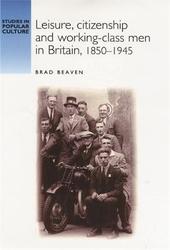
|
Leisure, Citizenship and Working-Class Men in Britain, 1850-1940
Paperback / softback
Main Details
| Title |
Leisure, Citizenship and Working-Class Men in Britain, 1850-1940
|
| Authors and Contributors |
By (author) Brad Beaven
|
| Series | Studies in Popular Culture |
|---|
| Physical Properties |
| Format:Paperback / softback | | Pages:272 | | Dimensions(mm): Height 234,Width 156 |
|
| ISBN/Barcode |
9780719060281
|
| Classifications | Dewey:306.48120810941 |
|---|
| Audience | | General | | Tertiary Education (US: College) | | Professional & Vocational | |
|---|
|
Publishing Details |
| Publisher |
Manchester University Press
|
| Imprint |
Manchester University Press
|
| Publication Date |
7 August 2009 |
| Publication Country |
United Kingdom
|
Description
From the bawdy audience of a Victorian Penny Gaff to the excitable crowd of an early twentieth century football match, working-class male leisure proved to be a contentious issue for contemporary observers. For middle-class social reformers from across the political spectrum, the spectacle of popular leisure offered a view of working-class habits, and a means by which lifestyles and behaviour could be assessed. For the mid-Victorians, gingerly stepping into a new mass democratic age, the desire to create a bond between the recently enfranchised male worker and the nation was more important than ever. This trend continued as those in governance perceived that 'good' leisure and citizenship could fend off challenges to social stability such as imperial decline, the mass degenerate city, hooliganism, civic and voter apathy and fascism. Thus, between 1850 and 1945 the issue of male leisure became enmeshed with changing contemporary debates on the encroaching mass society and its implications for good citizenry. Working-class culture has often been depicted as an atomised and fragmented entity lacking any significant cultural contestation. Drawing on a wealth of primary and secondary source material, this book powerfully challenges these recent assumptions and places social class centre stage once more. Arguing that there was a remarkable continuity in male working-class culture between 1850 and 1945, Beaven contends that despite changing socio-economic contexts, male working-class culture continued to draw from a tradition of active participation and cultural contestation that was both class and gender exclusive. This lively and readable book draws from fascinating accounts from those who participated in and observed contemporary popular leisure making it of importance to students and teachers of social history, popular culture, urban history, historical geography, historical sociology and cultural studies. -- .
Author Biography
Brad Beaven is a Senior Lecturer in Social History at the University of Portsmouth
ReviewsBeaven's examination of the Coventry case is a welcome addition to a literature that has been overly dominated by London and Lancashire. This is a bold study that reviews working-class male leisure, and the concerns it gave rise to, across an extensive period. Its thematic scope and its local basis usefully complement existing work. Beaven has produced a significant and timely contribution to our understanding of popular leisure in the late nineteenth and early twentieth centuries. James Thompson, University of Bristol
|